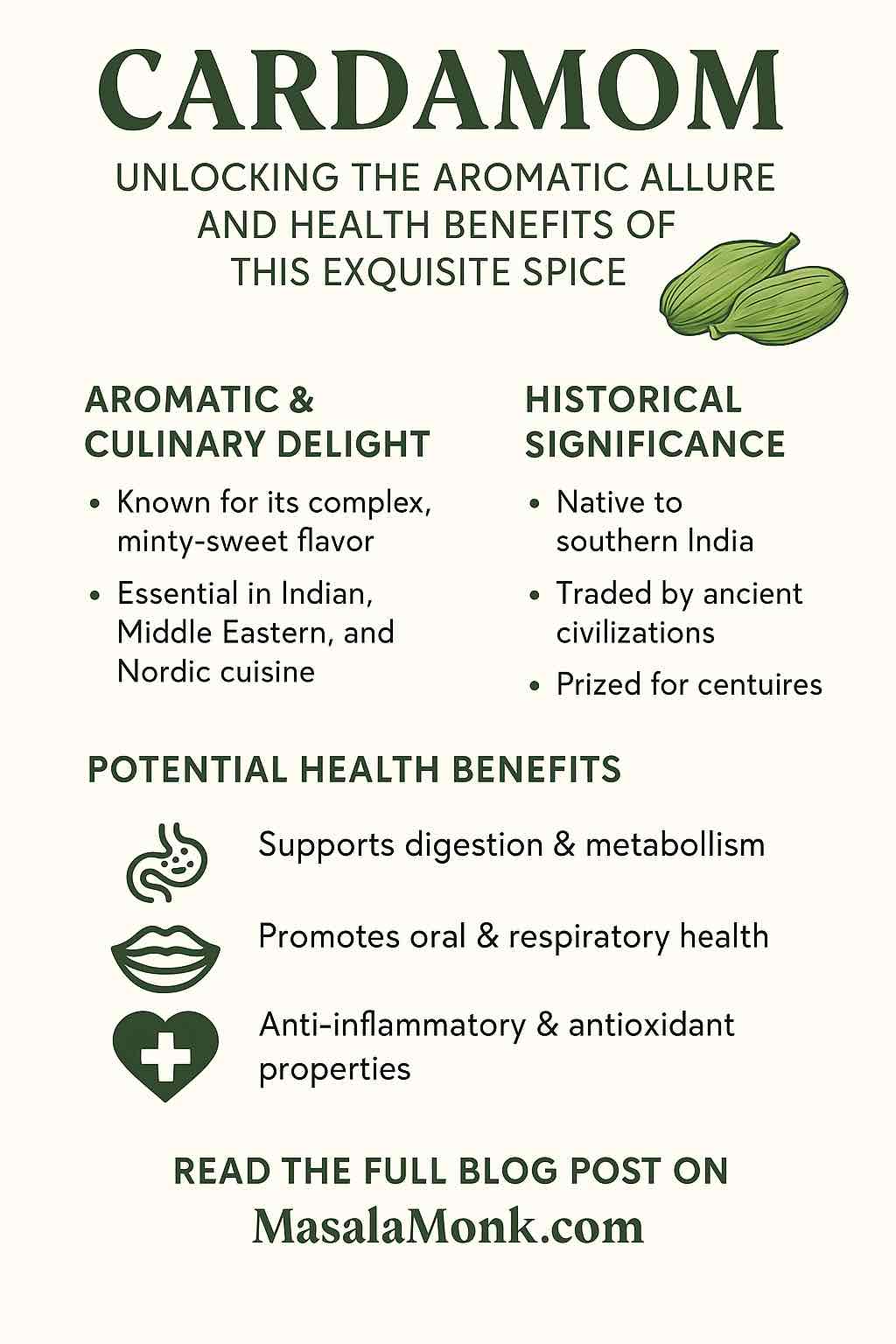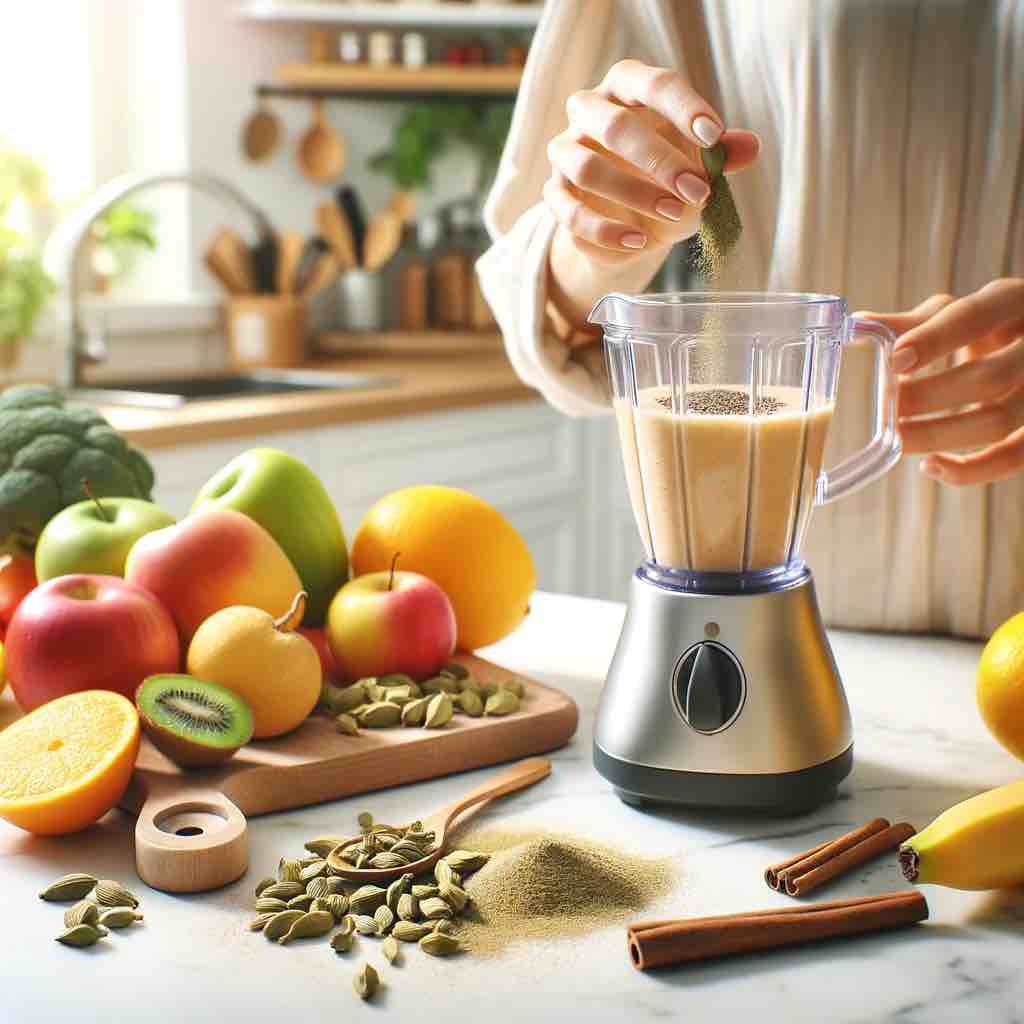
Introduction
Imagine a spice so entwined in our culinary and cultural fabric that its mere aroma can transport you to memories of festive gatherings and cozy evenings. This is the allure of cardamom, a spice revered not just for its distinctive flavor but also for its storied past in traditional medicine. But when the journey of pregnancy begins, the lens through which we view even the most familiar things can shift dramatically. For expectant mothers, the kitchen transforms into a place of both excitement and caution, where every ingredient is scrutinized for its benefits and potential risks to the little life blossoming within.
In this complex tapestry of nutrition and safety, cardamom emerges as a topic of interest and intrigue. Known scientifically as Elettaria cardamomum, this small but mighty spice holds a place of honor in many spice racks. Its versatility sees it gracing everything from the heartwarming masala chai to the most exquisite of desserts. Yet, in the delicate state of pregnancy, the question arises: Is it safe to consume cardamom?
As you embark on this informative journey through our blog post, we aim to unravel the mysteries surrounding cardamom’s use during pregnancy. Pregnancy, a time of profound transformation and heightened awareness, demands a nuanced understanding of dietary choices. Here, we delve into the heart of this question, exploring not just the safety but also the potential benefits and considerations of consuming cardamom while expecting.
Our narrative will guide you through the different trimesters, each with its unique needs and cautions, shedding light on how cardamom fits into the ever-changing landscape of pregnancy nutrition. Whether you’re grappling with morning sickness in the early months, navigating the cravings and aversions of the second trimester, or preparing your body for the final stretch towards motherhood, understanding the role of spices like cardamom becomes pivotal.
So, let’s embark on this journey together, unraveling the threads of traditional wisdom, scientific research, and maternal well-being, to discover whether cardamom is a friend or a foe to the expecting mother.
Overview of Cardamom: A Spice with a Story
In the world of spices, cardamom holds a special place. Often referred to as the “Queen of Spices,” its history is as rich and varied as its flavor profile. Originating from the wild forests of the Western Ghats in India, cardamom has journeyed across continents and cultures, finding its way into the heart of many cuisines and traditional remedies. But what exactly is cardamom, and why does it captivate the senses so?
Cardamom comes in two main varieties: the green cardamom (Elettaria cardamomum) and the black cardamom (Amomum subulatum). Green cardamom, with its small, light green pods, is known for its sweet and subtly eucalyptus-like flavor. It’s a staple in Scandinavian and Middle Eastern cuisines, a key ingredient in the beloved chai, and a silent hero in many sweet treats. Black cardamom, larger and with a rougher, darker exterior, offers a more intense and smoky flavor. This variety is often used in robust Indian and African dishes, lending a depth of flavor that is unmistakable.
The journey of cardamom from a wild plant to a cherished kitchen companion is a testament to its versatility and allure. It’s not just the taste that makes cardamom so prized; it’s also its reputed health benefits. Historically, cardamom has been used in Ayurvedic and traditional Chinese medicine for its potential therapeutic properties, ranging from aiding digestion to alleviating respiratory issues. Its essential oils are prized in aromatherapy, and its antioxidant and anti-inflammatory properties have been noted in various scientific studies.
However, when it comes to pregnancy, the lens through which we view foods and spices shifts significantly. Pregnancy is a time of heightened sensitivity and awareness, where every dietary choice is weighed for its impact on both the mother and the growing baby. This is where the story of cardamom takes an interesting turn. The question is no longer just about the flavors and aromas it brings to our dishes; it’s about understanding how this potent spice interacts with the complex physiology of pregnancy.
As we delve deeper into the nuances of cardamom’s use during pregnancy, we find ourselves navigating a landscape where tradition meets science, and culinary delight intertwines with maternal health. The following sections will explore how cardamom fares in the realm of pregnancy, examining its safety, benefits, and any precautions that need to be taken. Whether you’re an expectant mother, a partner, or simply someone looking to expand their knowledge, this journey through the world of cardamom promises to be as enlightening as it is flavorful.
The Role of Diet in Pregnancy: Nourishing Mother and Baby
The journey of pregnancy is as much a physical transformation as it is an emotional and spiritual one. During this time, the role of diet transcends mere nutrition—it becomes a cornerstone for ensuring the health and well-being of both the mother and the developing baby. Every morsel consumed is a building block in the intricate process of creating new life. This section explores the profound importance of dietary choices during pregnancy and how cardamom, along with other ingredients, fits into this delicate balance.
Understanding Nutritional Needs
Pregnancy is a time of increased nutritional demands. The body requires additional vitamins, minerals, and macronutrients to support fetal growth and maternal health. Key nutrients such as folic acid, iron, calcium, and omega-3 fatty acids become crucial. It’s a delicate dance of nourishment, where both quality and quantity of food matter. However, navigating through the myriad of dietary advice, cultural beliefs, and personal preferences can be overwhelming for expectant mothers.
Dietary Concerns and Precautions
As the body undergoes hormonal and physical changes, it reacts differently to foods. Some women may develop sensitivities or aversions to certain flavors and smells, especially during the first trimester, when nausea and morning sickness are common. On the other hand, cravings for specific foods can emerge, reflecting the body’s intuitive search for certain nutrients.
In this landscape, spices like cardamom can play a dual role. They not only enhance the flavor of food, catering to altered taste preferences but may also offer therapeutic benefits, such as aiding digestion and alleviating nausea. However, the question remains: are all spices, including cardamom, equally safe and beneficial throughout the different stages of pregnancy?
Adapting Diet Across Different Trimesters
Each trimester of pregnancy brings its unique challenges and nutritional requirements. The first trimester, marked by rapid fetal development, demands a focus on folic acid and vitamin D. The second trimester, with its increased appetite and stabilized nausea, may allow for a more varied diet, including a thoughtful incorporation of spices like cardamom. The third trimester, characterized by rapid fetal growth and preparation for childbirth, might require adjusting portion sizes and nutrient intake to support this final growth phase.
In this context, understanding the role and safety of cardamom at each stage becomes critical. Can the same spice that soothes a mother’s stomach in the second trimester pose risks in the first or third? The answer lies in not just the properties of the spice itself but also in how it’s consumed—quantity, form, and combination with other foods.
Cardamom in Focus
As we dive deeper into the specifics of cardamom, we aim to unravel these questions. The following sections will closely examine the safety profile of cardamom during pregnancy, its potential benefits, and the best ways to incorporate it into a pregnancy-friendly diet. By doing so, we hope to provide expectant mothers and their families with the information needed to make informed, safe, and enjoyable dietary choices during this special time.
Cardamom and Pregnancy: Navigating Safety and Benefits
As we delve into the heart of our exploration, the spotlight turns to cardamom, a spice cherished in kitchens and cultures worldwide. In the realm of pregnancy, where every dietary choice is scrutinized for its impact on maternal and fetal health, understanding the safety and potential benefits of cardamom is paramount. This section seeks to unravel the complexities surrounding cardamom consumption during pregnancy, guided by scientific insights and traditional wisdom.
Safety Profile of Cardamom in Pregnancy
The primary concern for any food or spice during pregnancy is its safety. Can it harm the mother or the baby? For cardamom, the consensus among health experts and nutritionists is generally reassuring. Cardamom is considered safe for consumption during pregnancy when used in moderation as a culinary spice. Its natural compounds, while potent in flavor and fragrance, do not pose significant risks to pregnancy when consumed in typical food amounts.
Moderation is Key
The mantra for using cardamom during pregnancy is moderation. Like many spices, cardamom’s intense flavor means it is typically used in small quantities, which falls within the safe consumption range. However, it’s crucial to differentiate between culinary use and medicinal use. While the former involves small, flavor-enhancing amounts, the latter can imply higher doses, which might not be advisable during pregnancy without professional guidance.
Trimester-Specific Considerations
Each trimester of pregnancy comes with its unique set of considerations. In the first trimester, when the risk of miscarriage is higher, it’s advisable to be more cautious with all dietary choices, including the use of strong spices like cardamom. As the pregnancy progresses into the second and third trimesters, the body generally adapts better to dietary spices, and cardamom can be used more liberally, provided it remains within the culinary use realm.
Potential Benefits of Cardamom During Pregnancy
Beyond its safety profile, cardamom is celebrated for its potential health benefits, which may be particularly advantageous during pregnancy.
Digestive Comfort
Cardamom is known for its digestive properties. It can stimulate the secretion of bile acids in the stomach, aiding in digestion and potentially providing relief from common pregnancy-related issues like indigestion and bloating.
Nausea Relief
For many pregnant women, nausea and morning sickness are common challenges, especially in the early stages. The soothing aroma and flavor of cardamom, often used in teas and dishes, can help alleviate these symptoms, making it a favored spice for many expecting mothers.
Oral Health
Pregnancy can sometimes increase the risk of dental problems due to hormonal changes affecting oral health. Cardamom’s antibacterial properties can contribute to maintaining a healthy oral cavity, reducing the risk of dental issues.
Blood Sugar and Blood Pressure Regulation
Emerging research suggests that cardamom may have a role in regulating blood sugar and blood pressure levels. For pregnant women, especially those at risk of gestational diabetes or hypertension, incorporating cardamom in moderation into their diet could offer additional health benefits.
Consulting Healthcare Professionals
Despite the general safety and potential benefits of cardamom, it’s crucial for pregnant women to consult with their healthcare providers before making any significant changes to their diet, including the use of spices like cardamom. This is particularly important for those with pre-existing health conditions or specific dietary restrictions.
In conclusion, while cardamom can be a delightful and beneficial addition to a pregnancy diet, its use must be balanced with awareness and caution. The following sections will further explore how to incorporate cardamom into a pregnancy-friendly diet, ensuring that its use is both safe and enjoyable.
Incorporating Cardamom into a Pregnancy Diet: Practical Tips and Recipes
Having established the safety and potential benefits of cardamom during pregnancy, let’s turn our attention to how this aromatic spice can be practically and safely incorporated into a pregnancy-friendly diet. This section aims to provide expectant mothers with creative and healthful ways to enjoy cardamom, ensuring that its use not only enhances flavor but also contributes positively to prenatal nutrition.
Understanding the Flavor Profile
Before diving into specific uses, it’s important to appreciate the unique flavor profile of cardamom. Known for its sweet, pungent taste and a slightly minty aroma, cardamom is a versatile spice that can seamlessly blend into both sweet and savory dishes. Its distinct taste can elevate the simplest of recipes, making it a favorite among culinary enthusiasts.
Culinary Uses of Cardamom
Sweet Delights
- Cardamom-Infused Desserts: For those with a sweet tooth, cardamom can be a delightful addition to desserts. It pairs beautifully with fruits, dairy, and pastries. Simple recipes like cardamom-flavored rice pudding, spiced fruit compotes, or cardamom-infused baked goods can satisfy cravings in a healthful way.
- Healthy Snack Options: Mixing a pinch of cardamom into yogurt or sprinkling it over oatmeal can transform these healthy snacks into more flavorful and appealing options, especially useful for days when nausea makes eating a challenge.
Savory Selections
- Spicing Up Meals: Cardamom can be used to season a variety of dishes, from simple vegetable stir-fries to more elaborate meat preparations. Its flavor complements a wide range of ingredients, making it a valuable spice in diverse culinary traditions.
- Homemade Spice Blends: Creating homemade spice blends, such as a mild curry powder or a fragrant garam masala mix, allows for control over the spice levels and ensures that no unwanted additives are included.
Cardamom in Beverages
Herbal Teas and Decoctions
- Soothing Teas: Brewing a light cardamom tea can be soothing, especially for dealing with nausea or digestive discomfort. However, it’s essential to be mindful of the caffeine content in certain teas and opt for decaffeinated or herbal options when possible.
- Flavoring for Warm Drinks: A pinch of ground cardamom can enhance the taste of warm milk or a decaffeinated latte, offering comfort and warmth.
Cooking with Cardamom: Tips for Expectant Mothers
- Start Small: If you’re new to cardamom, start with a small amount to see how you like the flavor and how your body reacts to it.
- Whole Pods vs. Ground Cardamom: Whole cardamom pods release flavor more slowly and can be easier to manage in terms of intensity. Ground cardamom provides a more immediate and potent flavor.
- Quality Matters: Opt for high-quality, organic cardamom to ensure the best flavor and avoid potential contaminants.
Cardamom Recipes for Pregnancy
Let’s explore a few simple, nutritious, and delicious recipes that incorporate cardamom, catering to the diverse taste preferences and dietary needs of pregnant women.
Cardamom-Spiced Fruit Salad
A refreshing and easy-to-make snack that combines the natural sweetness of fruits with the aromatic flavor of cardamom.
Creamy Cardamom Rice Pudding
A comforting and nutritious dessert, perfect for satisfying sweet cravings while providing a good source of calcium and energy.
Mildly Spiced Vegetable Curry
A wholesome and belly-friendly curry recipe that uses cardamom as part of a gentle spice blend, ideal for a nourishing family meal.
Conclusion: Embracing Cardamom in Pregnancy
Incorporating cardamom into a pregnancy diet offers a blend of culinary enjoyment and potential health benefits. Whether used in small doses to alleviate nausea or as a flavor enhancer in a variety of dishes, cardamom can safely add zest to the diet of expectant mothers. As always, moderation and personal preference should guide its use, and consultation with a healthcare provider is advised for any dietary changes during pregnancy.
In the next section, we will answer some frequently asked questions about cardamom during pregnancy, addressing common concerns and providing further clarity on this aromatic spice’s role in prenatal nutrition.
Frequently Asked Questions: Cardamom and Pregnancy
In this section, we address some common questions and concerns about consuming cardamom during pregnancy. These FAQs are compiled based on inquiries from expectant mothers, recommendations from healthcare professionals, and insights from nutritional experts, providing a comprehensive guide to understanding the safe use of cardamom in pregnancy.
1. Can Consuming Cardamom Lead to Any Pregnancy Complications?
Generally, when used as a culinary spice in moderate amounts, cardamom does not lead to pregnancy complications. However, it’s important to avoid excessive consumption, as large quantities of any spice can potentially cause digestive discomfort or other issues. Always listen to your body and consult with your healthcare provider if you have any concerns.
2. Is It Safe to Drink Cardamom Tea During Pregnancy?
Cardamom tea, especially when caffeine-free, can be a safe and soothing choice during pregnancy. The key is moderation. Avoid high-caffeine teas and opt for herbal or decaffeinated versions if including cardamom. Always check with your healthcare provider, particularly if you have any specific dietary restrictions or health concerns.
3. How Much Cardamom Is Safe During Pregnancy?
While there isn’t a strict guideline on the exact amount, a general rule of thumb is to use cardamom as you would any other spice – sparingly and as part of a varied diet. A daily limit of about 1 to 2 grams of cardamom is considered safe for most people. Remember, a little goes a long way with this potent spice.
4. Can Cardamom Help with Morning Sickness?
Many women find the aroma and flavor of cardamom soothing, and it may help alleviate symptoms of morning sickness. Including a small amount of cardamom in tea or food might provide relief from nausea. However, every woman’s experience with pregnancy symptoms is unique, so it’s important to find what works best for you.
5. Are There Any Risks of Allergic Reactions to Cardamom During Pregnancy?
As with any food, there is a potential for allergic reactions to cardamom. If you’ve never had cardamom before, start with a small amount and monitor your body’s response. If you experience any symptoms of an allergic reaction, such as itching, swelling, or difficulty breathing, seek medical attention.
6. Can Cardamom Affect Blood Pressure During Pregnancy?
Cardamom has been traditionally known to have blood pressure-lowering effects. If you have a history of low blood pressure or are taking blood pressure medication, consult your healthcare provider before adding cardamom to your diet.
7. Are There Any Specific Ways to Include Cardamom in a Pregnancy Diet?
Cardamom can be included in various ways, such as sprinkled over oatmeal, blended into smoothies, added to baked goods, or used in savory dishes like curries and soups. The key is to use it in moderation and as part of a balanced diet.
8. Can Cardamom Be Used in All Trimesters of Pregnancy?
Yes, cardamom can be used in all trimesters, but it’s advisable to be more cautious during the first trimester due to the increased risk of miscarriage. As with any dietary choice during pregnancy, moderation and consultation with a healthcare provider are recommended.
Conclusion
Cardamom, with its enchanting flavor and potential health benefits, can be a delightful addition to a pregnancy diet when used judiciously. It’s important to balance enjoyment of this spice with an awareness of its potency and the unique needs of your body during pregnancy. Always prioritize safety and moderation, and when in doubt, consult your healthcare provider for personalized advice.
In the next and final section, we’ll provide a summary and concluding thoughts on the safe and beneficial use of cardamom during pregnancy.
Summary and Concluding Thoughts: Embracing Cardamom During Pregnancy
As we draw this comprehensive exploration to a close, let’s revisit the key points and insights gathered about the use of cardamom during pregnancy. This journey has taken us through the aromatic lanes of culinary traditions, into the realms of nutritional science, and through the practical aspects of incorporating this beloved spice into a pregnancy diet.
The Essence of Cardamom in Pregnancy
- Safety and Moderation: The overarching theme in the use of cardamom during pregnancy is its safety when consumed in moderation. As a culinary spice, cardamom adds flavor and aroma to a variety of dishes without posing significant health risks to the mother or baby.
- Health Benefits: We’ve seen that cardamom can offer several health benefits, such as aiding digestion, alleviating nausea, and potentially regulating blood pressure and blood sugar levels, which are particularly relevant during pregnancy.
- Cultural and Emotional Significance: Beyond its physical benefits, cardamom holds a special place in many cultures. Its use in pregnancy can also be a way to stay connected to cultural roots and traditions, adding an emotional wellness aspect to its consumption.
Practical Advice for Expectant Mothers
- Incorporating Cardamom in Diet: Whether in teas, desserts, or savory dishes, there are numerous ways to include cardamom in a pregnancy diet. The key is to start with small amounts and adjust according to taste and tolerance.
- Listening to the Body: Every pregnancy is unique, and so are the body’s responses to different foods and spices. It’s important for expectant mothers to listen to their bodies and adjust their diets accordingly.
- Consultation with Healthcare Providers: Given the individual nature of each pregnancy, consulting with healthcare providers before making significant dietary changes, including the use of cardamom, is essential. This is particularly important for those with pre-existing medical conditions or specific dietary concerns.
Final Thoughts
In conclusion, cardamom can be a safe, enjoyable, and beneficial addition to a pregnancy diet, provided it is used wisely and in moderation. Its multifaceted role as a culinary enhancer, a bearer of health benefits, and a cultural symbol makes it more than just a spice – it’s a small yet significant part of the pregnancy journey.
As we conclude, we encourage expectant mothers to embrace the joys and challenges of pregnancy nutrition with curiosity and care. Remember, the journey through pregnancy is as much about nourishing the body as it is about cherishing each moment and flavor along the way.














